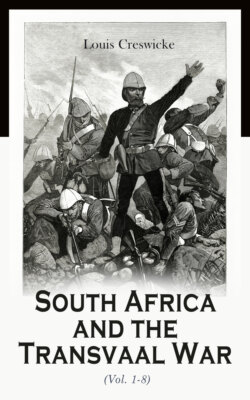Читать книгу South Africa and the Transvaal War (Vol. 1-8) - Louis Creswicke - Страница 60
На сайте Литреса книга снята с продажи.
ОглавлениеCHAPTER I
Table of Contents
THE CRISIS AT HOME
Table of Contents
"Patience, long sick to death, is dead. Too long
Have sloth and doubt and treason bidden us be
What Cromwell's England was not, when the sea
To him bore witness, given of Blake, how strong
She stood, a commonweal that brooked no wrong
From foes less vile than men like wolves set free,
Whose war is waged where none may fight or flee—
With women and with weanlings. Speech and song
Lack utterance now for loathing. Scarce we hear
Foul tongues, that blacken God's dishonoured name
With prayers turned curses and with praise found shame,
Defy the truth whose witness now draws near
To scourge these dogs, agape with jaws afoam,
Down out of life. Strike, England, and strike home."
—Algernon Charles Swinburne.
In the face of the insolent Ultimatum which had been addressed to Great Britain by the South African Republic, the nation closed its ranks and relegated party controversy to a more appropriate season. The British people were temporarily in accord. A wave of indignation surged over the country, and united men of different shades of politics and of varying religious creeds, making them forget their private feuds, and remember only the paramount fact that they were sons of the Empire. There were some, it is true, who remained afar off—a few exceptions to prove the rule of unanimity, beings with souls so dead that never to themselves had said, "This is my own, my native land," and who yet looked upon the Boer as an object of commiseration. But these were, first, men linked either by birth or family ties with the Afrikander cause; second, fractious Irishmen and political obstructionists who posed for notoriety at any price; and, third, eccentrics and originals, whose sense of opposition forbade them from floating at any time with the tide of public opinion. Every one else cried aloud for a chance to uphold Great Britain's prestige, and the War Office was so beset with applications from volunteers for the front that it was found almost impossible even to consider them. Nor was the excitement confined to officers alone. Recruiting went on apace, and not only did recruits pour in, but deserters, who had slunk away from regimental duty, now returned and gave themselves up, praying to be allowed to suffer any penalty and then march out to battle as soldiers of the Queen! Two Royal Proclamations having been issued—the one directing the continuance in army service, until discharged or transferred to the reserve, of soldiers whose term of service had expired or was about to expire; the other, ordering the army reserve to be called out on permanent service—some 25,000 men received notice to rejoin the colours. These in large numbers promptly appeared. The New South Wales Lancers, who had been going through a course of cavalry training at Aldershot, at once volunteered their services and started for the Cape amidst scenes of great enthusiasm. Other colonial troops were as eager to join, and the spirit of military rivalry throughout Her Majesty's dominions was both amazing and inspiriting.
Queensland had the honour of opening the ball. Her sympathy with the policy of Great Britain and her loyalty to the mother country was shown in practical form. She intimated, in the event of hostilities, her willingness to send 250 mounted infantry and a machine-gun to the front. New Zealand followed suit; she also offered two companies of mounted rifles fully equipped at the cost of the Colony. These offers were gratefully accepted. Not to be behind-hand, Western Australia and Tasmania made similar offers, and Her Majesty's Government gladly agreed to accept one unit of 125 men from each. The Parliament of Victoria voted the despatch of a contingent of 250 men to South Africa, and the Governments of New South Wales and South Australia actively discussed similar measures. This expression of Colonial public opinion, embodying as it did the independent judgments of so many free juries, uninfluenced by personal or direct interests, had a significance which, besides being politically important, was eminently satisfactory. All Her Majesty's dominions, on which the sun never sets, were at this critical moment holding hands in a wide circle that encompassed the earth, and the picture of the small mother country with all her big children gathered around her in her hour of need was not one that the romance of history can afford to disregard.
